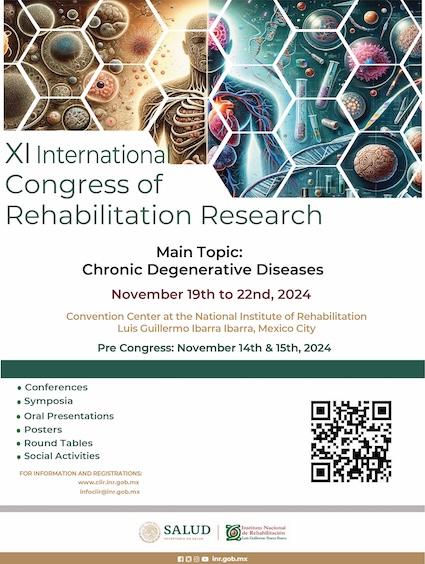Assessment of patient satisfaction as a quality health indicator in a physical therapy service
DOI:
https://doi.org/10.35366/116871Keywords:
healthcare quality, patient satisfaction, physical therapyAbstract
Introduction: it is important the evaluation of user satisfaction, as an indicator of quality in health care. A satisfied patient is more willing to follow therapeutic recommendations to improve their health. Objective: to describe user satisfaction with physical therapy care and identify factors associated with less satisfaction. Material and methods: an observational, cross-sectional, and analytical survey-type study was conducted in patients at the physical therapy service at the end of their treatment at the National Institute of Rehabilitation «Luis Guillermo Ibarra Ibarra» (INRLGII), from January to December 2022. The MedRisk and Patient Satisfaction with Physical Therapy Questionnaire (PSQ-E) were answered personally by each patient. Other variables were collected from the medical records. We described sociodemographic data using percentages and compared mean satisfaction across interest groups using the Student’s t-test. Results: we analyzed 323 user surveys. The mean satisfaction was 4.4 (0.6) with PSQ-E and 4.6 (0.5) for MedRisk. We detected 125 responses classified into three
different areas of opportunity by the PSQ-E. The determinants associated with less satisfaction were basic schooling, users with paid activity, diagnosis > 1 year and group sessions. Conclusion: although more than 80% of the users were satisfied with the care received using two different instruments, the PSQ-E detects areas of opportunity. We must encourage the search for indicators that guide us towards continuous improvement.
References
Larson E, Sharma J, Bohren MA, Tuncalp O. When the patient is the expert: measuring patient experience and satisfaction with care. Bull World Health Organ. 2019; 97 (8): 563-569.
Coronado-Zarco R, Cruz-Medina E, Salvador, Macías Hernández SI, Arellano Hernández A, Nava Bringas TI. El contexto actual de la calidad en salud y sus indicadores. Rev Mex Med Fis Rehab. 2013; 25 (1): 26-33.
Serrano-del Rosal R, Loriente-Arín N. La anatomía de la satisfacción del paciente. Salud Publica Mex. 2008; 50 (2): 162-172. Disponible en: http://www. scielosp.org/scielo.php?script=sci_arttext&pid=S0036- 36342008000200010&lng=es&nrm=iso&tlng=es
Hush JM, Cameron K, Mackey M. Patient satisfaction with musculoskeletal physical therapy care: a systematic review. Phys Ther. 2011; 91 (1): 25-36.
Endawoke M, Alem G, Mulugeta H, Atinafu BT, Nigussie F, Simachew A, Shimekaw A, Abiye M. Patients satisfaction and associated factors towards physiotherapy services in north west Ethiopia. Patient Prefer Adherence. 2021; 15: 2783-2791.
IssaK,NaziriQ,JohnsonAJ,MemonT,DattiloJ,Harwin SF et al. Evaluation of patient satisfaction with physical therapy following primary THA. Orthopedics. 2013; 36 (5): e538-542.
Osuna-Pérez C, Pancobro-Hidalgo PL, Cuesta-Vargas AI. Información terapéutica, satisfacción y confianza en fisioterapia: instrumentos de medida y estudio
correlacional en centros de fisioterapia de Andalucía Oriental. [Internet]. Tesis Doctoral. Universidad de Jaén, editor. España; 2012 [Citado 2024 Mayo 11]. 1-371. Disponible en: https://hdl.handle.net/10953/387
Gutiérrez-SánchezD,Pérez-CruzadoD,Cuesta-Vargas AI. Instruments for Measuring Satisfaction With Physical Therapy Care: A Systematic Review. Phys Ther. 2020; 100 (9): 1690-1700.
EscatllarGM.Adaptaciónyvalidacióndeuncuestionario para medir la satisfacción del tratamiento de fisioterapia en Atención Primaria [Internet]. Cataluña; 2017 Jul [Citado 2024 Mayo 11]. Disponible en: https://repositori. urv.cat/fourrepopublic/search/item/TDX%3A2581
Nicholson V, Tuttle N, Papinniemi A, Evans K. Patients report being satisfied with private musculoskeletal physical therapy when therapists educate effectively and facilitate shared decision making. Braz J Phys Ther. 2023; 27 (2): 100501.
Althobaiti AM, Alshehri FH, Althobaiti MM, Alzahrani H, Almeheyawi RN, Alshehre YM et al. Translation, cross- cultural adaptation, and psychometric properties of the Arabic version of the MedRisk instrument for measuring patient satisfaction with physical therapy care. Disabil Rehabil. 2024: 1-7.
Nierenberg N, Tzemah Shahar R, Naamneh- Abuelhija B, Milman U, Gardner R, Agmon M. Hebrew version of the physical therapy patient satisfaction questionnaire: cross-cultural adaptation and psychometric properties. Physiother Theory Pract. 2022; 38 (13): 2929-2937.
Cai C, Neo JH. The MedRisk instrument for measuring patient satisfaction with physical therapy care: validation in the Singapore outpatient physiotherapy setting. Physiother Theory Pract. 2023; 39 (3): 590-597.
Yesilyaprak SS, Ozyurek S, Tomruk M, Ilcin N, Karadibak D, Keskinoglu P et al. The Turkish version of the MedRisk instrument for measuring patient satisfaction: measurement properties in physical therapy care among inpatients. Disabil Rehabil. 2020; 42 (2): 247-254.
Rossettini G, Latini TM, Palese A, Jack SM, Ristori D, Gonzatto S, Testa M. Determinants of patient satisfaction in outpatient musculoskeletal physiotherapy: a systematic, qualitative meta-summary, and meta- synthesis. Disabil Rehabil. 2020; 42 (4): 460-472.
Downloads
Published
How to Cite
Issue
Section
License
Copyright (c) 2024 Instituto Nacional de Rehabilitación Luis Guillermo Ibarra Ibarra

This work is licensed under a Creative Commons Attribution 4.0 International License.
© Instituto Nacional de Rehabilitación Luis Guillermo Ibarra Ibarra under a Creative Commons Attribution 4.0 International (CC BY 4.0) license which allows to reproduce and modify the content if appropiate recognition to the original source is given.




